Bilingualism as a desirable difficulty: Advantages in word learning depend on regulation of the dominant language
- PMID: 31762685
- PMCID: PMC6874380
- DOI: 10.1017/S1366728918000858
Bilingualism as a desirable difficulty: Advantages in word learning depend on regulation of the dominant language
Abstract
Bilingualism imposes costs to language processing but benefits to word learning. We test a new hypothesis that relates costs in language processing at study to benefits in learning at test as desirable difficulties. While previous studies have taught vocabulary via bilinguals' native language (L1), recent evidence suggests that bilinguals acquire regulatory skill in the L1 to coordinate the use of each language. We hypothesized that L1 regulation underlies the observed costs and benefits, with word learning advantages depending on learning via the L1. Four groups learned novel Dutch words via English translations: English monolinguals, and English-Spanish, Spanish-English, and Chinese-English bilinguals. Only English-Spanish bilinguals demonstrated a word learning advantage, but they adopted a costly study strategy compared to monolinguals. The results suggest that bilingual advantages in vocabulary learning depend on learning via the L1 or dominant language because learning via the L1 allows bilinguals to engage regulatory skills that benefit learning.
Figures
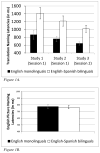
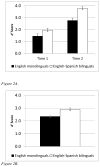
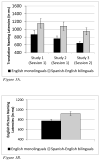
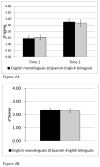
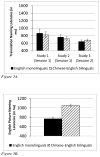
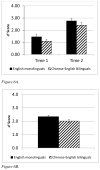

References
-
- Abutalebi J, Cappa SF, Perani D. The bilingual brain as revealed by functional neuroimaging. Bilingualism: Language and Cognition. 2001;4:179–190. doi: 10.1017/S136672890100027X. - DOI
-
- Baayen RH, Piepenbrock R, Gulikers L. The CELEX lexical database (online) 1995
